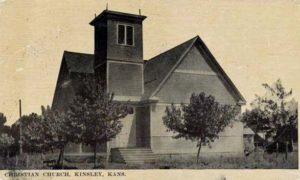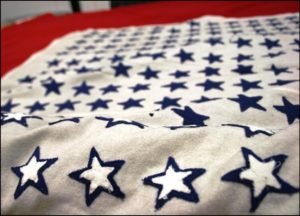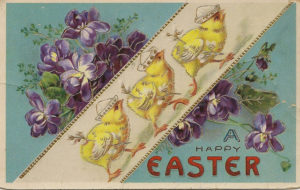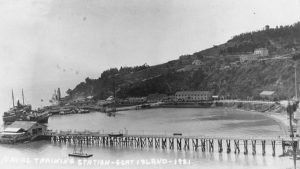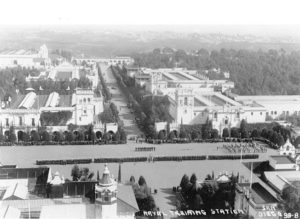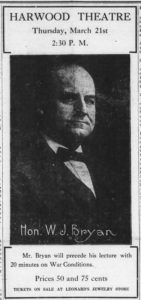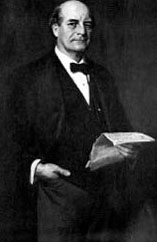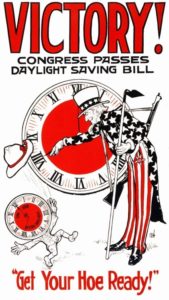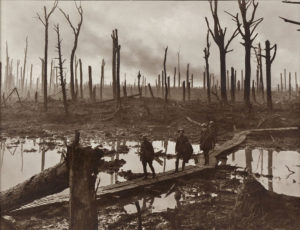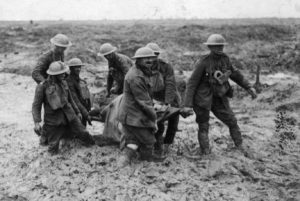In March 1917, Robert Earl Britton begins writing letter back to the J. M. Lewis, editor of the Graphic from the Naval Training Camp on Goat Island, California. Robert Earl was born January 20, 1891 in Key West, Coffey County, Kansas to Robert H. and Mattie E. Britton. He had 2 older sisters and a younger sister, Julia. His father moved to Edwards County to farm.
Robert enlisted in the navy in December, 1917 with three other friends from Edwards County. I want to tell you a little about them as they seem to stay together and will be mentioned in Robert Earl’s letters in the future.
First of all there was Everett L. Bitner who enlisted at the same time with Britton. Everett was born September 13, 1893 in Colorado to Ira and Ella Bitner who moved to Edwards County to farm.
Then there was Raymond Clarkson Julian of Fellsburg (born February 28, 1894). He became Robert Britton’s brother-in-law when he married Julia Britton on New Year’s Day, 1916. One year later, she sadly died in childbirth on January 24, 1917 at age 22. Their baby, Evan Ray Julian survived and I believe was taken in by Julia’s parents when Raymond enlisted in the navy in December, 1917. Later when he got back from the war he would remarry and Evan would live with him.
William Howard Lovell enlisted with Julian. Lovell had been born on May 1, 1893 in Mississippi to William A and Florence S Lovell. I tried to find out a little about him and did see that in the 1910 census his father was in jail. I don’t know what brought him to Kansas, but I believe he was working as a farm laborer around Trousdale, Kansas when he enlisted.
On March 3, 1918 Robert Earl Britton wrote his first letter back to the Graphic.
“I am taking the privilege of writing to you at this time regarding our trip and welfare since our departing from Kinsley and our friends and loved ones. (Everett L.) Bitner, (Raymond C.) Julian, (William Howard) Lovett and myself were assigned to the same section in the Pullman, the same table in the diner and on our arrival here to the same company, (B, 7). We left Kansas City at 6:30 p.m., Saturday, February 23. It was rather a touching yet a thrilling sight that crowd of cheering boys, and weeping mothers, sisters and sweat hearts that filled one wing of that spacious union depot.”
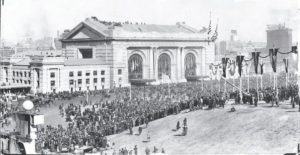 (Might have looked something like dedication day of the Union Station in Kansas City, 1914.)
(Might have looked something like dedication day of the Union Station in Kansas City, 1914.)
“We were routed on the Union Pacific via Denver and Ogden then Southern Pacific to San Francisco. On the entire trip the boys were in the best of spirits. There was not a hamlet we passed through that we were not reminded of the fact that there was someone on the road to Berlin via San Francisco and Panama. Out in Brigham Young’s state at Ogden we were taken by an early morning surprise and marched thru the main streets in double rank formation carrying a lot of flags and giving an assortment of yells, but our ranks were broken up in a hurry when we went by, or rather came to, a shorthand school. Just a few “hello boys” from the students “Fair Sex” and we marched in and took possession for half an hour while the professor and teachers enjoyed the fun with us. From there to the depot we were a happy looking bunch and at our departure there were perhaps a hundred pretty girls standing by “at attention.” As the train rolled on around the great salt lake. The next event was that “Wild Cat Country” where the women go to get a divorce known as Nevada. John Barley Corn is still prospering in that vicinity although he didn’t get rich off us because first the most of us didn’t use it and next because Uncle Sam would not permit it. The last morning of our trip and dawn of a day long to be remembered by us who entered the raining station on that day, was a very beautiful sunshiny morning. At daybreak we were descending the west slope of the Sierra Nevadas down into the beautiful Sacramento valley. Those beautiful little mountain valleys covered with green grass, vineyards, orchards and peach blossoms. Then as we descended into the wide fertile valley at the Sacramento proper we spied our first big ripe oranges hanging in those big busy trees with the dark green foliage. Then came the mud flats and then San Francisco Bay. We passed through San Francisco and to Goat Island then into the detention barracks where we will remain for three weeks.
The last cheer the boys gave was in the ferry building at San Francisco for the atmosphere changed when that gold braid stepped up and ordered a salute and a snap at this fellow and at that, it was really amusing to note the change in the countenance of the bunch. So far I like it fine and I assure you the Edwards County boys are of the best of spirits and are well satisfied with the part they are taking in the service of their country. We are making sailors out of ourselves as fast as we can. We look the part already. Mr. Lewis you are right. Speak a word for us to our mothers, sisters and sweet hearts and tell them we like candy, cake and cigars, which we do not get much of here. The next time I write I am going to give you a sketch of the first three weeks in the U.S.N.T.S. at the D. B.
Sincerely yours, Robert Earl Britton U. S. N. T. S., San Francisco, California, D. Company, B, 7.”


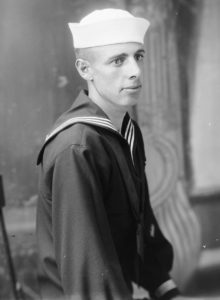 This picture of an unknown WWI sailor was taken by the Belpre photographer, W. O. Durstine. Perhaps it is one of these four men who lived in the area.
This picture of an unknown WWI sailor was taken by the Belpre photographer, W. O. Durstine. Perhaps it is one of these four men who lived in the area.
